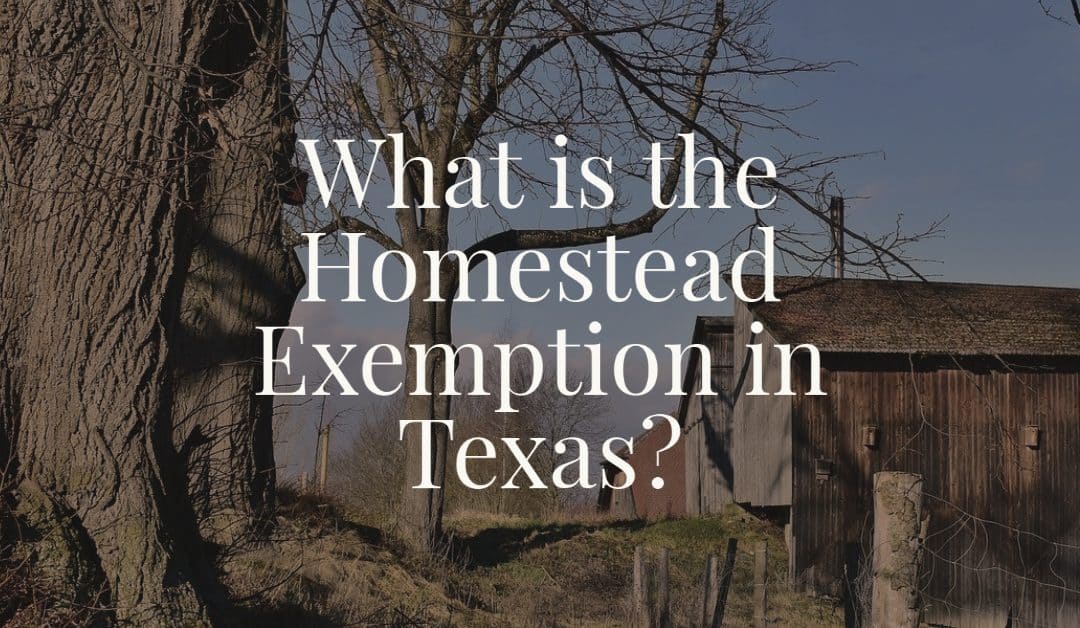
In Texas, there is a homestead tax exemption. The county applies this exemption to different types of taxes. One type of homestead tax exemption makes a percentage of your home’s value not taxable. Because there is no state property tax in Texas, schools and other community services pay for their budget with the citizens’ taxes in their district.
In these turbulent economic times, we can all appreciate any tax exemption. Let’s look at how you can take advantage of this benefit for yourself.
How Much Can I Save?
If you have a home worth $200,000 and you apply and receive a homestead exemption, you only pay tax on $110,000 to $175,000 of the value of your home. Depending on where you live in Texas, anywhere from 25-45% of your home value is exempt from taxes.
Exactly how much you pay depends on the tax rates in your district.
Qualifications
There are a few qualifications you must meet to receive a homestead exemption in Texas.
- The home must be your principal residence.
- You must be the owner. (a business entity does not own your home)
- You must use the home as your principal residence on Jan 1 of the tax year.
- You must not claim an exemption on another residence homestead.
If you are age 65 or older or disabled, or both, you can also receive an additional exemption of $10,000 per year.
What Kind of Home Qualifies?
A homestead can be many different kinds of housing and still qualify for the exemption as long as you own the home itself. You can also include up to 20 acres of land you own and use as part of your residence.
All of these types of homes qualify:
- Stick-built home
- Condominium
- Manufactured home located on owned or leased land
Types of Tax Exemptions
Exemptions provided for many different types of taxes include:
- School taxes: $25,000 homestead exemption from their home’s value for school taxes.
- County taxes: County special tax $3000 exemption
- Optional percentage exemptions: Cities, counties, schools, or special districts, may offer an additional $5000 exemption or up to 20 percent of a home’s value. They may also provide an additional exemption amount of at least $3,000 for taxpayers age 65 or older and/or disabled.
How Do I Apply for a Homestead Exemption
To apply for a homestead exemption, submit an Application for Residential Homestead Exemption (PDF) and supporting documentation with the appraisal district where the property is located. The application must include a copy of your driver’s license or state identification card and is generally before May 1 of that tax year.
What If I Move Temporarily?
Certain types of moves do not disqualify you from the homestead exemption in Texas. For the move to be considered temporary, you must not establish a principal residence elsewhere, you must intend to return to the home, and you must be away less than two years.
If you are away longer than two years, you must be in military service or live in a facility providing services related to health, infirmity, or aging to qualify.
What If I Inherit Property?
If you inherit property through a transfer on death deed, through a will, or in intestate (from the court when someone has no will), there is a different process for you to go through to claim your exemption. You must take additional steps if your name is not yet on the deed in the county where the property is located. In this case, you must provide your county with these details:
- an affidavit establishing ownership of an interest in the property
- a copy of the prior property owner’s death certificate
- a copy of the property’s most recent utility bill
- a citation of any court record relating to your ownership of the property, if available
If you own the property with siblings or other family who inherited, they must each sign an affidavit authorizing your application. You can fill out the proper documents at the county clerk’s office in the county where the property is located.
What if I Own a Home with Others?
If you are not the only owner of your residence, you may be wondering how to get a homestead exemption. The answer is different depending on your situation. As a married couple in Texas, you own property as community property. This means that according to the law, you both own your home 100%. So there is no need to separate how much each of you owns. You apply together on the same application.
If you have partial ownership, you receive an exemption amount based on the interest you own in the home. For example, if you own half with another owner, you would receive half of the exemption amount in any homestead exemption claims.
If you are confused about applying for exemption, contact your local appraisal district for more information regarding your eligibility.
Find Help
For all of your legal property issues, contact an experienced real estate attorney who understands the law and how to make informed decisions regarding your difficulties. Texas’s laws have many nuances and practical applications that you may not understand, but your attorney specializes in making sure your rights are protected. At Jarrett Law, we want to come alongside you as your partner in legal troubles. Give us a call or contact us online and let us know how we can help.
https://comptroller.texas.gov/taxes/property-tax/exemptions/residence-faq.php

